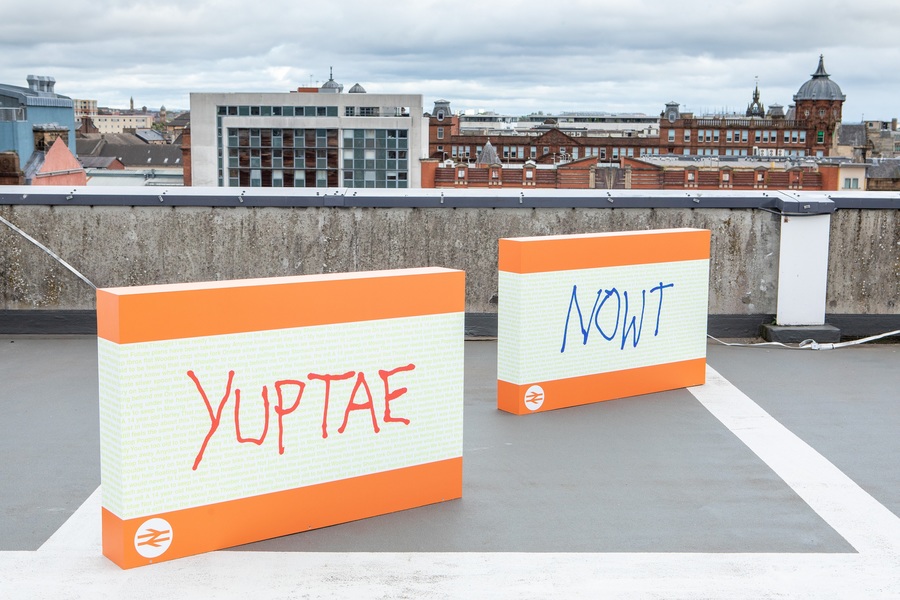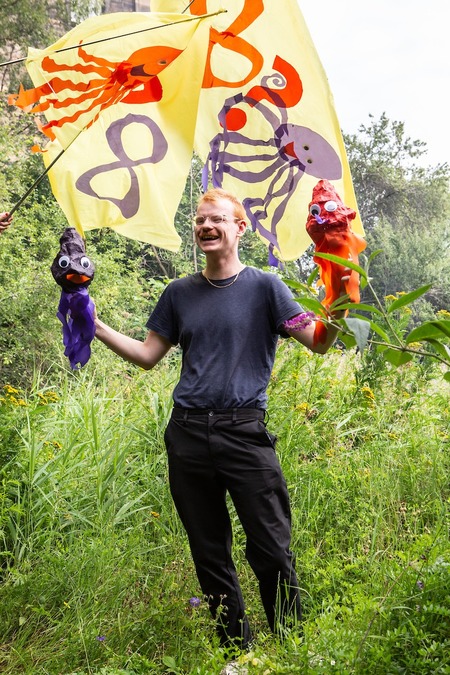Where's all the art gone in Glasgow?
Art event listings in Glasgow have been decreasing for a while. Why? What's happening on the ground, and what does this mean for art activity as a whole in the city? Eight of the city's most active artists, curators and organisers share their insights
‘What’s happening in Glasgow’ is the subject of the email that comes through from Rosamund, the Editor-in-Chief. Listings for Art have been gradually shrinking since pre-COVID times, and they’ve not bounced back in the same way as the other sections. More galleries are closing than opening, and as much as the grassroots arts culture in Glasgow is often paid lip service, how stable a foundation is this for the city’s art activity? Eight interviewees have been brought together here to look for some answers to this broad and lowkey dreadful question: where’s the art activity gone in Glasgow?
Poet, educator and artist Robert Thomas James Mills was last on these pages as he rowed down the Clyde for Glasgow International 2018. He suggested we meet in Ushi’s Coffee Corner, the brand new "and only DIY queer vegan filter coffee spot in G2 (or the UK for that matter)." He admits he didn’t plan to go to this place deliberately, but that it’s a topical setting. "Coincidentally, this feels like a space where we would have done events." Maybe the city’s butting into this conversation. New spaces are opening, people are still making shit happen.
Speaking about the idea of the ‘just do it’ DIY attitude, Mills says: "I’m for people getting paid. I come from a working-class background. People can say they’re working-class if they want, I’m not here to gatekeep that but I will have my private opinion." Same. "If someone says 'I’m doing an event tomorrow, do you want to come along slash help out slash play at it?' No, because from 1pm 'til 4pm I’m going to have my youth work job then from 5pm 'til 12am I’m going to my restaurant job. Unless you give me three weeks notice, and unless you pay me, I’m going to lose money."
As well as money being tighter than ever, there are also issues of distance. "Not everyone’s a five-minute walk from the West End anymore. People are on social media less and everyone’s dispersed. Where are the community noticeboards? There are so many spam emails and newsletters. If I didn’t bump into that person or someone didn’t come into my work and get a coffee [and happen to ask] 'Are you going along tonight …?' I wouldn’t know what was on." Memo: check The Skinny. But still, the point stands. Rent hikes have meant people are shifting all around the city and beyond to find a place where they’re not going to get kicked out whenever the property bubble has swollen enough for the landlord to decide to sell up. Shout out to all the new Paisley residents.
This isn’t the only time the subject of property comes up. Glasgow Women’s Library co-founder Adele Patrick mentions the serious effects for the city’s DIY art scene of the transfer of the council’s properties to City Property Glasgow LLP and the subsequent requirement that market rent would be demanded for previously publicly held buildings and shop fronts. "How many creative epiphanies, connections, moments of insight and passion have been fomented in visiting each other's spaces? [They were] ramshackle but exciting. Glasgow Women’s Library could not have started now."
For Patrick, this is an example of the absence of working knowhow within the Council on what a cultural scene needs to thrive, and part of an extended 30-year period of negligence in relation to arts in the city. "We have to say it's a failed leadership at work here. And the fact that the political and cultural guardians have not reflected on what gave rise to that sense of blossoming and flourishing. A particular stressor has been this resistance to developing cultural literacy within the council. Where there are councillors – they might be well-meaning and lovely – unless there are people who are deeply knowledgeable about culture and the arts and deeply aware of what's happening in the world, deeply committed to the city, it's going nowhere."
Alongside city politics, insidious changes to immigration regulations for international students are cited as another stressor on the artist network in the city. Francis McKee is Director of the Centre of Contemporary Art and a tutor and research fellow at Glasgow School of Art. He describes the "brilliant networks of students who have studied here from all around the world. They love Glasgow and they have friends here… They want to give something to the city, it’s not like they’re going to make a fortune from staying in Glasgow [and working] in the art scene. It’s this unbelievable gift they keep on offering." They’re forced to leave: an extension of the same system that prides itself on making a ‘hostile environment’.
Also working in the Glasgow School of Art, artist and lecturer Marianne Greated teaches on the Painting and Printmaking course. Greated embeds (and this is speaking from firsthand experience) an ethic of cooperation throughout her teaching, and she encourages students not just to feel excited about their own work but also each other’s. Greated tells the story of what’s been happening since COVID restrictions have been relaxed in the previous months. "We have had so many pop-up student exhibitions, there has been absolutely loads." Greated admits that she’s genuinely "not sure if this is followed through in the sector more widely." Nevertheless, when it comes to the students, they are "just desperate to do live events, and get that experience and have a live audience. It’s been really busy, there’s been tonnes of stuff going on."
This seems to hold true for 2020 GSA graduate Robert McCormack. Since he graduated without a degree show, he’s been running events and exhibitions – whether he’s in them or not – whenever and however COVID regulations allow, including a cross-city multi-venue Alt Degree Show, the Graduate Drive Thru exhibition for him and his peers on the rooftop of a carpark, and group shows in Transmission and CCA. For McCormack, the idea that there’s been a downtick in art in the city doesn’t match onto his last couple of years, but the experience has been intense.
"For the car park we got ourselves paid, not by the art school [who funded most of the shows McCormack mentions] but by a different funder. Not very much and definitely not enough, but I think we would have lost our shit early on if we weren't being paid. For the CCA one and the Transmission, we weren’t being paid… I work five days a week in a care job at the moment. So I was going to the school [where McCormack works], coming home, going on my laptop, making food, going on my laptop, going to bed and doing it again." To manage to pull the car park show together, McCormack had to leave one job and start another one, and time it so the show was in the middle. McCormack mentions how the people he worked closest with have also felt some severe effects of burnout since that time. "Now I’ve had to say no to a few projects."
While graduate group shows might traditionally be one sign of an active art scene, another less-visible indication of continuing artistic activity in the city is brought up by Director of The Common Guild, Katrina Brown. "There are waiting lists for studios… and there are new studios cropping up. [I visited] Strangefield Space on French Street in Dalmarnock and there were ten to 12 people in a space there. I’d never been there before, and it only opened during the pandemic time. There is a long waiting list at Glasgow Sculpture Studios, too."
This idea comes up again that artistic activity is going on even if not in the form of public-facing shows and events. Visual artist, teacher and researcher Ashanti Harris describes some of her work as co-lead artist for Project X – "a creative education programme, platforming the dances of the African diaspora." Harris says that through the pandemic, Project X have been doing several projects. "They’ve been less outward, we’ve been in conversation with the artists we work with about what they want. At the start of the year, we were talking to artists who normally teach for Project X about what they need to continue their teaching practice and… the artists we were working with were saying they wanted more time and support to figure out what they’re doing and what they’re working on… But what actually happened was when we created the time and space for people… all everyone wanted to do was to create events and performances and put them in the world. So people ended up putting on film screenings of what they’ve been doing, and sharings… It’s a rocky road; what you think you need one week might be completely different to what you need the next."
This experience of the last two years has led to new ways of structuring ways of working with artists for Harris at Project X. "If anything, what we’ve taken forward in how we’re going to work collaboratively or collectively with others [is that] we need to form projects and activities that are really flexible to change. Every project doesn’t necessarily have a public expectation, but always having a pot for a public outcome if that feels appropriate in the moment."
All eight interviewees are generous with their time, including artist Danny Pagarani who cycles over to my place on a Sunday morning because I’m looking after a nervous greyhound. Maybe because we’re in my living room, I can admit when it comes to this enquiry I'm not just an observer. I could have featured more events, I could have commissioned more reviews of what’s been going on in Glasgow during the last seven years that I’ve been running the Art section. This is my last article as Art editor, so the balance sheet is final: have I done enough to platform all the tireless efforts that go into making Glasgow a place I like living? "No," Pagarani answers. "But also yes. 'Not enough' from each person… together that’s hopefully enough."

